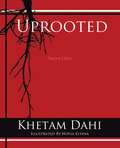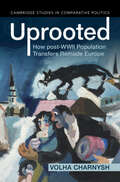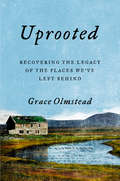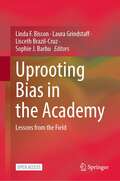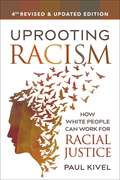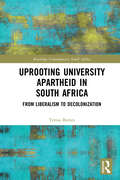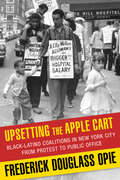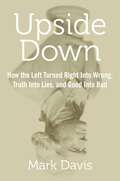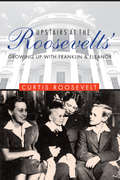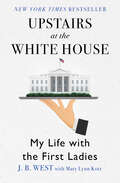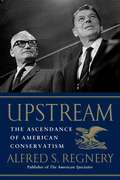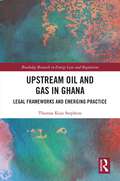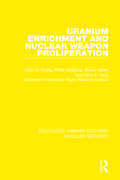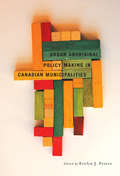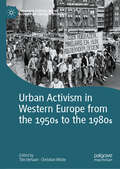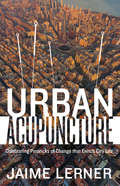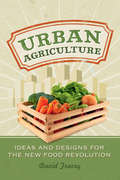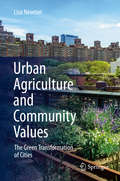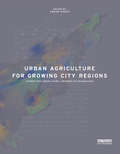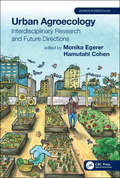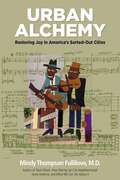- Table View
- List View
Uprooted (Second Edition)
by Khetam Dahi Novia ElvinaIn a simple yet honest and powerful prose, Dahi, through the eyes of a child turning adolescent, narrates the everyday existence of immigrant and working-class families.
Uprooted: How post-WWII Population Transfers Remade Europe (Cambridge Studies in Comparative Politics)
by Volha CharnyshEach year, millions of people are uprooted from their homes by wars, repression, natural disasters, and climate change. In Uprooted, Volha Charnysh presents a fresh perspective on the developmental consequences of mass displacement, arguing that accommodating the displaced population can strengthen receiving states and benefit local economies. Drawing on extensive research on post-WWII Poland and West Germany, Charnysh shows that the rupture of social ties and increased cultural diversity in affected communities not only decreased social cohesion, but also shored up the demand for state-provided resources, which facilitated the accumulation of state capacity. Over time, areas that received a larger and more diverse influx of migrants achieved higher levels of entrepreneurship, education, and income. With its rich insights and compelling evidence, Uprooted challenges common assumptions about the costs of forced displacement and cultural diversity and proposes a novel mechanism linking wars to state-building.
Uprooted: Recovering the Legacy of the Places We've Left Behind
by Grace Olmstead"A superior exploration of the consequences of the hollowing out of our agricultural heartlands."—Kirkus ReviewsIn the tradition of Wendell Berry, a young writer wrestles with what we owe the places we&’ve left behind. In the tiny farm town of Emmett, Idaho, there are two kinds of people: those who leave and those who stay. Those who leave go in search of greener pastures, better jobs, and college. Those who stay are left to contend with thinning communities, punishing government farm policy, and environmental decay. Grace Olmstead, now a journalist in Washington, DC, is one who left, and in Uprooted, she examines the heartbreaking consequences of uprooting—for Emmett, and for the greater heartland America. Part memoir, part journalistic investigation, Uprooted wrestles with the questions of what we owe the places we come from and what we are willing to sacrifice for profit and progress. As part of her own quest to decide whether or not to return to her roots, Olmstead revisits the stories of those who, like her great-grandparents and grandparents, made Emmett a strong community and her childhood idyllic. She looks at the stark realities of farming life today, identifying the government policies and big agriculture practices that make it almost impossible for such towns to survive. And she explores the ranks of Emmett&’s newcomers and what growth means for the area&’s farming tradition. Avoiding both sentimental devotion to the past and blind faith in progress, Olmstead uncovers ways modern life attacks all of our roots, both metaphorical and literal. She brings readers face to face with the damage and brain drain left in the wake of our pursuit of self-improvement, economic opportunity, and so-called growth. Ultimately, she comes to an uneasy conclusion for herself: one can cultivate habits and practices that promote rootedness wherever one may be, but: some things, once lost, cannot be recovered.
Uprooting Bias in the Academy: Lessons from the Field
by Laura Grindstaff Linda F. Bisson Lisceth Brazil-Cruz Sophie J. BarbuThis open access book analyzes barriers to inclusion in academia and details ways to create a more diverse, inclusive environment. It describes the implementation of UC Davis ADVANCE, a grant program funded by the National Science Foundation, to increase the hiring and retention of underrepresented scholars in the STEM fields (science, technology, engineering and mathematics) and foster a culture of inclusion for all faculty. It first describes what the barriers to inclusion are and how they function within the broader society. A key focus here is the concept of implicit bias: what it is, how it develops, and the importance of training organizational members to recognize and challenge it. It then discusses the limitations of data collection that is guided by the convention assumption that being diverse automatically means being inclusive. Lastly, it highlights the importance of creating a collaborative, interdisciplinary, and institution-wide vision of an inclusive community.
Uprooting Racism: How White People Can Work for Racial Justice
by Paul Kivel&“The &‘how-to manual&’ for whites to work with people of color to create an inclusive, just world in the 21st century.&” —Maggie Potapchuk, racial equity consultant Over 50,000 copies sold of earlier editions! Completely revised and updated, this fourth edition of Uprooting Racism offers a framework around neoliberalism and interpersonal, institutional, and cultural racism, along with stories of resistance and white solidarity. It provides practical tools and advice on how white people can work as allies for racial justice, engaging the reader through questions, exercises, and suggestions for action, and includes a wealth of information about specific cultural groups such as Muslims, people with mixed heritage, Native Americans, Jews, recent immigrants, Asian Americans, and Latino/as. Inequalities in education, housing, health care, and the job market continue to prevail, while increased insecurity and fear have led to an epidemic of scapegoating and harassment of people of color. Yet, recent polls show that only thirty-one percent of white people in the United States believe racism is a major societal problem; at the same time, resistance is strong, as highlighted by indigenous struggles for land and sovereignty and the Movement for Black Lives. This accessible, personal, supportive, and practical guide is ideal for students, community activists, teachers, youth workers, and anyone interested in issues of diversity, multiculturalism, and social justice. &“A uniquely sensitive, wise, practical guide for white people struggling with their feelings about race.&” —Howard Zinn, national bestselling author of A People&’s History of the United States &“A powerful and wonderful book, a major contribution to our understanding of racism as white people.&” —Judith H. Katz, Ed. D., author, White Awareness: Handbook for Anti-Racism Training
Uprooting University Apartheid in South Africa: From Liberalism to Decolonization (Routledge Contemporary South Africa)
by Teresa A. BarnesSouth Africa continues to be an object of fascination for people everywhere interested in social justice issues, postcolonial studies and critical race theory as manifested by the enormous worldwide attention given to the #RhodesMustFall movement. In this book, Teresa Barnes examines universities’ complex positioning in the apartheid era and argues that tracing the institutional legacies left by pro-apartheid intellectuals are crucial to understanding the fight to transform South African higher education. A work of interpretive social history, this book investigates three historical dynamics in the relationship between the apartheid system and South African higher education. First, it explores how the legitimacy of apartheid was historically reproduced in public higher education. Second, it looks at ways that academics maneuvered through and influenced national and international discourses of political freedom and legitimacy. Third, it explores how and where stubborn tendrils of apartheid-era knowledge production practices survived into and have been combatted during the democratic era in South African universities.
Upsetting the Apple Cart: Black-Latino Coalitions in New York City from Protest to Public Office
by Frederick Douglass OpieAn exciting new history of the activists, protestors, politicians, and even recipes that changed New York City.
Upsetting the Apple Cart: Black-Latino Coalitions in New York City from Protest to Public Office (Columbia History of Urban Life)
by Frederick OpieUpsetting the Apple Cart surveys the history of black-Latino coalitions in New York City from 1959 to 1989. In those years, African American and Latino Progressives organized, mobilized, and transformed neighborhoods, workplaces, university campuses, and representative government in the nation's urban capital. Upsetting the Apple Cart makes new contributions to our understanding of protest movements and strikes in the 1960s and 1970s and reveals the little-known role of left-of-center organizations in New York City politics as well as the influence of Jesse Jackson's 1984 and 1988 presidential campaigns on city elections. Frederick Douglass Opie provides a social history of black and Latino working-class collaboration in shared living and work spaces and exposes racist suspicion and divisive jockeying among elites in political clubs and anti-poverty programs. He ultimately offers a different interpretation of the story of the labor, student, civil rights, and Black Power movements than has been traditionally told. His work highlights both the largely unknown agents of historic change in the city and the noted politicians, political strategists, and union leaders whose careers were built on this history. Also, as Napoleon said, "An army marches on its stomach," and Opie's history equally delves into the role that food plays in social movements, with representative recipes from the American South and the Caribbean included throughout.
Upside Down: How the Left Turned Right into Wrong, Truth into Lies, and Good into Bad
by Mark DavisFossil fuels are bad. Illegal immigration is necessary for the economy. Free markets are arbitrary and cruel. Christians are intolerant. Men and women are exactly the same.The dogma preached by the far left has gone mainstream and the results are frightening: Most of what you hear these days is flat-out wrong. Mark Davis pulls apart the tenets of liberal dogma in Upside Down, a right-side-up correction of everything that's wrong with today's topsy-turvy world.
Upstairs at the Roosevelts': Growing Up with Franklin and Eleanor
by Curtis RooseveltCurtis Roosevelt knew what it was like to live with a president. His grandfather was Franklin Delano Roosevelt. From the time Curtis, with his sister, Eleanor, and recently divorced mother, Anna Roosevelt Dall, moved into his grandparents’ new home—the White House—Curtis played, learned, slept, ate, and lived in one of the most famous buildings in the world with one of its most famous residents. Curtis Roosevelt offers anecdotes and revelations about the lives of the president and First Lady and the many colorful personalities in this presidential family. From Eleanor’s shocking role in the remarriage of Curtis’s mother to visits from naughty cousins and trips to the “Home Farm,” Upstairs at the Roosevelts’ provides an intimate perspective on the dynamics of one of America’s most famous families and those who visited, were friends, and sometimes even enemies.
Upstairs at the White House: My Life with the First Ladies
by Mary Lynn Kotz J. B. WestIn this New York Times bestseller, the White House chief usher for nearly three decades offers a behind-the-scenes look at America&’s first families. J. B. West, chief usher of the White House, directed the operations and maintenance of 1600 Pennsylvania Avenue—and coordinated its daily life—at the request of the president and his family. He directed state functions; planned parties, weddings and funerals, gardens and playgrounds, and extensive renovations; and, with a large staff, supervised every activity in the presidential home. For twenty-eight years, first as assistant to the chief usher, then as chief usher, he witnessed national crises and triumphs, and interacted daily with six consecutive presidents and first ladies, as well as their parents, children and grandchildren, and houseguests—including friends, relatives, and heads of state. J. B. West, whom Jackie Kennedy called &“one of the most extraordinary men I have ever met,&” provides an absorbing, one-of-a-kind history of life among the first ladies. Alive with anecdotes ranging from Eleanor Roosevelt&’s fascinating political strategies to Jackie Kennedy&’s tragic loss and the personal struggles of Pat Nixon, Upstairs at the White House is a rich account of a slice of American history that usually remains behind closed doors.
Upstream
by Alfred S. RegneryAlfred S. Regnery, the publisher of The American Spectator, has been a part of the American conservative movement since childhood, when his father founded The Henry Regnery Company, which subsequently became Regnery Publishing -- the preeminent conservative publishing house that, among other notable achievements, published William F. Buckley's first book, God and Man at Yale. Including many uniquely personal anecdotes and stories, Regnery himself now boldly chronicles the development of the conservative movement from 1945 to the present. The outpouring of grief at the funeral of Ronald Reagan in 2004 -- and the acknowledgment that Reagan has come to be considered one of the greatest presidents of the twentieth century -- is Regnery's opening for a fascinating insider story. Beginning at the start of the twentieth century, he shows how in the years prior to and just post World War II, expanding government power at home and the expanding Communist empire abroad inspired conservatives to band together to fight these threats. The founding of the National Review, the drive to nominate Barry Goldwater first as vice-president and later as president, the apparent defeat of the conservative movement at the hands of Lyndon Johnson, and the triumphant rise of Ronald Reagan from the ashes are all chronicled in vivid prose that shows a uniquely intimate knowledge of the key figures. Regnery shares his views on the opposition that formed in response to Earl Warren's Supreme Court rulings, the role of faith (both Roman Catholic and Evangelical) in the renewed vigor of conservatism, and the contributing role of American businessmen who attempted to oppose big government. Upstream ultimately gives perspective to how the most vibrant political and cultural force of our time has influenced American culture, politics, economics, foreign policy, and all institutions and sectors of American life.
Upstream Oil and Gas in Ghana: Legal Frameworks and Emerging Practice (Routledge Research in Energy Law and Regulation)
by Thomas Kojo StephensThis book explores the myriad issues that play out in the upstream petroleum industry of Ghana from a legal perspective. Focusing on Ghana as an emerging petroleum country, Thomas Kojo Stephens begins by examining whether the existing constitutional framework will be effective in governing the expanding oil and gas sector. Drawing on various approaches proffered by other experts in the field, Stephens looks at possible institutional structures that could be put in place and juxtaposes these ideas with the experience of Ghana to test the efficacy of these proposals. He also explores the types of contractual frameworks currently implemented in Ghana for comparison with other emerging petroleum economies, examining the barriers to effectiveness, novel provisions that must be incorporated, and lessons learned from other regions. Finally, the book highlights how vital it is for the Ghanaian State to monitor the use of petroleum revenue and make ethical investment decisions that prioritize the interests of Ghanaian citizens. Upstream Oil and Gas in Ghana will be of great interest to students and scholars of energy law and policy, oil and gas management, and African Studies more broadly, as well as those working in the upstream petroleum industry.
Uranium Enrichment and Nuclear Weapon Proliferation (Routledge Library Editions: Nuclear Security)
by Allan S. Krass Peter Boskma Boelie Elzen Wim A. Smit Stockholm International Peace Research InstituteOriginally published in 1983, this book presents both the technical and political information necessary to evaluate the emerging threat to world security posed by recent advances in uranium enrichment technology. Uranium enrichment has played a relatively quiet but important role in the history of efforts by a number of nations to acquire nuclear weapons and by a number of others to prevent the proliferation of nuclear weapons. For many years the uranium enrichment industry was dominated by a single method, gaseous diffusion, which was technically complex, extremely capital-intensive, and highly inefficient in its use of energy. As long as this remained true, only the richest and most technically advanced nations could afford to pursue the enrichment route to weapon acquisition. But during the 1970s this situation changed dramatically. Several new and far more accessible enrichment techniques were developed, stimulated largely by the anticipation of a rapidly growing demand for enrichment services by the world-wide nuclear power industry. This proliferation of new techniques, coupled with the subsequent contraction of the commercial market for enriched uranium, has created a situation in which uranium enrichment technology might well become the most important contributor to further nuclear weapon proliferation. Some of the issues addressed in this book are: A technical analysis of the most important enrichment techniques in a form that is relevant to analysis of proliferation risks; A detailed projection of the world demand for uranium enrichment services; A summary and critique of present institutional non-proliferation arrangements in the world enrichment industry, and An identification of the states most likely to pursue the enrichment route to acquisition of nuclear weapons.
Urban Aboriginal Policy Making in Canadian Municipalities
by Evelyn J. PetersIndividual chapters highlight the unique issues related to policy making in this field - the important role of diverse Aboriginal organizations, the need to address Aboriginal and Treaty rights and the right to self-government, and the lack of governmental leadership - revealing a complex jurisdictional and programming maze. Contributors look at provinces where there has been extensive activity as well as provinces where urban Aboriginal issues seem largely irrelevant to governments. They cover small and mid-sized towns, remote communities, and large metropolises. While their research acknowledges that existing Aboriginal policy falls short in many ways, it also affirms that the field is new and there are grounds for improvement as it grows and matures. Contributors include Frances Abele (Carleton University), Chris Andersen (University of Alberta), Katherine A. H. Graham (Carleton University), Russell LaPointe (Carleton University), David J. Leech (Skelton-Clark Post-Doctoral Fellow, Queen's University), Maeengan Linklater (Mazinaate, Inc., Winnipeg), Michael McCrossan (Carleton University), James Moore (City of Kelowna), Karen Bridget Murray (York University), Evelyn J. Peters (University of Winnipeg), Jenna Strachan (Office of Intergovernmental Affairs, Kelowna BC ), Ryan Walker (University of Saskatchewan), and Robert Young (University of Western Ontario).
Urban Aboriginal Policy Making in Canadian Municipalities: Policy Making In Canadian Municipalities, Urban Aboriginal Policy Making In Canadian Municipalities (Fields of Governance: Policy Making in Canadian Municipalities #2)
by Evelyn J. PetersIndividual chapters highlight the unique issues related to policy making in this field - the important role of diverse Aboriginal organizations, the need to address Aboriginal and Treaty rights and the right to self-government, and the lack of governmental leadership - revealing a complex jurisdictional and programming maze. Contributors look at provinces where there has been extensive activity as well as provinces where urban Aboriginal issues seem largely irrelevant to governments. They cover small and mid-sized towns, remote communities, and large metropolises. While their research acknowledges that existing Aboriginal policy falls short in many ways, it also affirms that the field is new and there are grounds for improvement as it grows and matures. Contributors include Frances Abele (Carleton University), Chris Andersen (University of Alberta), Katherine A. H. Graham (Carleton University), Russell LaPointe (Carleton University), David J. Leech (Skelton-Clark Post-Doctoral Fellow, Queen's University), Maeengan Linklater (Mazinaate, Inc., Winnipeg), Michael McCrossan (Carleton University), James Moore (City of Kelowna), Karen Bridget Murray (York University), Evelyn J. Peters (University of Winnipeg), Jenna Strachan (Office of Intergovernmental Affairs, Kelowna BC ), Ryan Walker (University of Saskatchewan), and Robert Young (University of Western Ontario).
Urban Activism in Western Europe from the 1950s to the 1980s (Palgrave Studies in the History of Social Movements)
by Christian Wicke Tim VerlaanBringing together contributions from social, political, and urban historians, this collection examines social movements in Western European cities from the 1950s to the 1980s. Since their post-war recovery and reconstruction, cities in this part of the world underwent far-reaching societal transitions such as deindustrialisation and the rise of the service economy, the expansion and decline of local welfare regimes, suburbanisation and urban redevelopment, and the democratisation of urban politics. Indeed, the sources for urban activism have been manifold and the rehistoricization of this era through an urban lens is therefore valuable. The authors of this volume seek to provide a comprehensive and multifaceted understanding of how structural socio-economic, political, and cultural changes; ideological shifts; and urban spaces were intertwined in various place-dependent ways. By doing so, they offer fresh comparative and conceptual perspectives on urban activism. The book focuses on the ‘long 1970s’ – a structural break in time across the industrial West, which corresponded with the emergence of new social movements and an urban crisis that left a wasteland of abandoned factories, dilapidated workers’ housing, and stalling redevelopment schemes in its wake. Addressing how the post-industrial revolution socially, ideologically, and physically manifested itself in the urban environment, this book provides useful insights for colleagues in the fields of urban history, social history, political history, and social movement studies.
Urban Acupuncture
by Jaime LernerDuring his three terms as mayor of Curitiba, Brazil in the 1970s and '80s, architect and urbanist Jaime Lerner transformed his city into a global model of the sustainable and livable community. From the pioneering Bus Rapid Transit system to parks designed to catch runoff and reduce flooding and the creation of pedestrian-only zones, Lerner has been the driving force behind a host of innovative urban projects. In more than forty years of work in cities around the globe, Lerner has found that changes to a community don't need to be large-scale and expensive to have a transformative impact--in fact, one block, park, or a single person can have an outsized effect on life in the surrounding city. In Urban Acupuncture, Lerner celebrates these "pinpricks" of urbanism--projects, people, and initiatives from around the world that ripple through their communities to uplift city life. With meditative and descriptive prose, Lerner brings readers around the world to streets and neighborhoods where urban acupuncture has been practiced best, from the bustling La Boqueria market in Barcelona to the revitalization of the Cheonggyecheon River in Seoul, South Korea. Through this journey, Lerner invites us to re-examine the true building blocks of vibrant communities--the tree-lined avenues, night vendors, and songs and traditions that connect us to our cities and to one another. Urban Acupuncture is the first of Jaime Lerner's visionary work to be published in English. It is a love letter to the elements that make a street hum with life or a neighborhood feel like home, penned by one of the world's most successful advocates for sustainable and livable urbanism.
Urban Aerial Pesticide Spraying Campaigns: Government Disinformation, Industry Profits, and Public Harm (Routledge Explorations in Environmental Studies)
by Manuel ValléeThis book examines social processes that have contributed to growing pesticide use, with a particular focus on the role governments play in urban aerial pesticide spraying operations. Beyond being applied to sparsely populated farmland, pesticides have been increasingly used in densely populated urban environments, and when faced with invasive species, governments have resorted to large-scale aerial pesticide spraying operations in urban areas. This book focuses on New Zealand's 2002–2004 pesticide campaign to eradicate the Painted Apple Moth, which is the largest operation of its kind in world history, whether we consider its duration (29 months), its scope (at its peak the spraying zone was 10,632 hectares/26,272 acres), the number of sprayings that were administered (the pesticide was administered on 60 different days), or the number of people exposed to the spraying (190,000+). This book provides an in-depth understanding of the social processes that contributed to the incursion, why the government sought to eradicate the moth through aerial pesticide spraying, the ideological strategies they used to build and maintain public support, and why those strategies were effective. Urban Aerial Pesticide Spraying Campaigns will be of great interest to students and researchers of pesticides, environmental sociology, environmental history, environmental studies, political ecology, geography, medical sociology, and science and technology studies.
Urban Aerial Pesticide Spraying Campaigns: Government Disinformation, Industry Profits, and Public Harm (Routledge Explorations in Environmental Studies)
by Manuel ValléeThis book examines social processes that have contributed to growing pesticide use, with a particular focus on the role governments play in urban aerial pesticide spraying operations.Beyond being applied to sparsely populated farmland, pesticides have been increasingly used in densely populated urban environments, and when faced with invasive species, governments have resorted to large-scale aerial pesticide spraying operations in urban areas. This book focuses on New Zealand's 2002–2004 pesticide campaign to eradicate the Painted Apple Moth, which is the largest operation of its kind in world history, whether we consider its duration (29 months), its scope (at its peak the spraying zone was 10,632 hectares/26,272 acres), the number of sprayings that were administered (the pesticide was administered on 60 different days), or the number of people exposed to the spraying (190,000+). This book provides an in-depth understanding of the social processes that contributed to the incursion, why the government sought to eradicate the moth through aerial pesticide spraying, the ideological strategies they used to build and maintain public support, and why those strategies were effective.Urban Aerial Pesticide Spraying Campaigns will be of great interest to students and researchers of pesticides, environmental sociology, environmental history, environmental studies, political ecology, geography, medical sociology, and science and technology studies.The Open Access version of this book, available at http://www.taylorfrancis.com, has been made available under a Creative Commons Attribution-Non Commercial-No Derivatives (CC-BY-NC-ND) 4.0 license.
Urban Agriculture
by David TraceyUrban Agriculture is packed with ideas and designs for anyone interested in joining the new food revolution. First-time farmers and green thumbs alike will find advice on growing healthy, delicious, affordable food in urban settings. From condo balconies to community orchards, cities are coming alive with crops. Get growing!
Urban Agriculture and Community Values: The Green Transformation of Cities
by Lisa NewtonThis book addresses the evolving crisis in agriculture and sketches the 'community economy' that grounds agricultural enterprise more accurately than the industrial model. In its current practice, agriculture is (in the United States but increasingly in the rest of the world) unsustainable and destructive. The most immediately unsustainable feature of industrial agriculture is its dependence on the products of petroleum—as feedstock for fertilizers, herbicides, and pesticides, and as fuel for the farm machinery and transport of agricultural products into the cities. The problems of agriculture and in general the food systems to which it is attached range from the vulnerability of monocultures to new and stronger pests to the emerging medical problem of obesity. The need for agricultural reform is widely acknowledged; one part of the new work being done suggests that food production in the cities may solve several of its problems at once. This book is suitable for both undergraduate and graduate students in agriculture and environmental studies.
Urban Agriculture for Growing City Regions: Connecting Urban-Rural Spheres in Casablanca
by Matthias Kraume Maria Gerster-Bentaya Frank Helten Dieter Scherer Guido Spars Fouad Amraoui Abdelaziz Adidi Said Berdouz Majid Mansour Mohamed Mdafai Undine Giseker Mohamed ChlaidaThis book demonstrates how agriculture can play a determining role in integrated, climate-optimised urban development. Agriculture within urban growth centres today is more than an economic or social left-over or a niche practice. It is instead a complex system that offers multiple potentials for interaction with the urban system. Urban open space and agriculture can be linked to a productive green infrastructure – this forms new urban-rural linkages in the urbanizing region and helps shape the city. But in order to do this, agriculture has to be seen as an integral part of the urban fabric and it has to be put on the local agenda. Urban Agriculture for Growing City Regions takes the example of Casablanca, one of the fastest growing cities in North Africa, to investigate this approach. The creation of synergies between the urban and rural in an emerging megacity is demonstrated through pilot projects, design solutions, and multifunctional modules. These synergies assure greater resource efficiency; particularly regarding the use and reuse of water, and they strengthen regional food security and the social integration of multiple spheres. A transdisciplinary research approach brings together different scientific disciplines and local actors into a process of integrated knowledge production. The book will have a long lasting legacy and is essential reading for researchers, planners, practitioners and policy makers who are working on urban development and urban agricultural strategies.
Urban Agroecology: Interdisciplinary Research and Future Directions (Advances in Agroecology #23)
by Monika Egerer Hamutahl CohenToday, 20 percent of the global food supply relies on urban agriculture: social-ecological systems shaped by both human and non-human interactions. This book shows how urban agroecologists measure flora and fauna that underpin the ecological dynamics of these systems, and how people manage and benefit from these systems. It explains how the sociopolitical landscape in which these systems are embedded can in turn shape the social, ecological, political, and economic dynamics within them. Synthesizing interdisciplinary approaches in urban agroecology in the natural and social sciences, the book explores methodologies and new directions in research that can be adopted by scholars and practitioners alike. With contributions from researchers utilizing both social and natural science approaches, Urban Agroecology describes the current social-environmental understandings of the science, the movement and the practices in urban agroecology. By investigating the role of agroecology in cities, the book calls for the creation of spaces for food to be sustainably grown in urban spaces: an Urban Agriculture (UA) movement. Essential reading for graduate students, practitioners, policy makers and researchers, this book charts the course for accelerating this movement.
Urban Alchemy: Restoring Joy in America's Sorted-Out Cities
by Mindy Thompson FulliloveMindy Thompson Fullilove presents ways to strengthen neighborhood connectivity and empower marginalized communities through investigation of urban segregation from a social heath perspective. "Fullilove passionately demonstrates how, through an urbanity of inclusion, we can heal our fractured cities to make them whole again. What if divided neighborhoods were causing public health problems? What if a new approach to planning and design could tackle both the built environment and collective well-being at the same time? What if cities could help each other?Dr. Mindy Thompson Fullilove, the acclaimed author of Root Shock, uses her unique perspective as a public health psychiatrist to explore and identify ways of healing social and spatial fractures simultaneously. Using the work of French urbanist Michel Cantal-Dupart and the American urban design firm Rothschild Doyno Collaborative as guides as well as urban restoration projects from France and the US as exemplary cases, Fullilove identifies nine tools that can mend our broken cities and reconnect our communities to make them whole.
